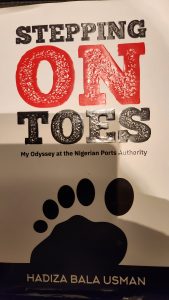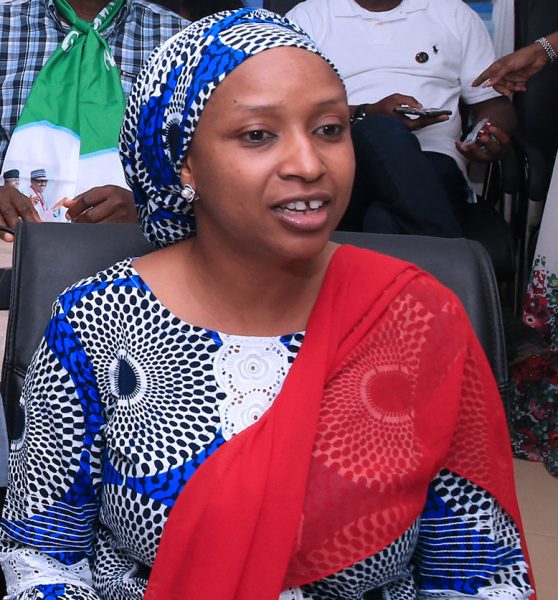By Ibrahim Sodiq
Dr. Bolaji Akinola’s “Hadiza’s Book of 99 Errors,” syndicated in the media last week, is an unmitigated let-down from a man of the author’s status and standing in the maritime sector.
Although he exposed his mission by describing the book as “Hadiza Bala Usman’s polemic” at the beginning of his piece, one expected more from a self-confessed industry stakeholder like this media consultant.
Akinola, who holds a master’s degree in Transport Management, is a Fellow of the Nigerian Institute of Shipping (NIS) and a Fellow of the Certified Institute of Shipping of Nigeria (CISN). He also consults for leading maritime companies and should be able to provide quality information that confirms or contradicts the important points that Bala Usman raised in her book. But what do we get? A treatise on the construction of English sentences and whatnot!

That is not to dismiss the fact that the proofreading of the book could have been better. However, a stakeholder who has constituted himself into an essential factor for industry players (except for Bala Usman), should be more concerned about the issues. Unless, of course, there are some other motives.
The hypocrisy of Akinola’s attempt to diminish what Bala Usman’s book will contribute to public service is his inability to avoid errors in his 1469-word article. I will give only two examples.
Akinola identified tautologies in Bala Usman’s book, yet the knowledgeable one could not save himself from the same error. In the second paragraph of his article, he wrote: “the book, I must point out, is REPLETE (emphasis mine) with MANY (emphasis mine) errors…”This doctor of letters should know that “many” is redundant in this context!
In the second to the last sentence of paragraph 13, he wrote: “Clearly, the word “date” should have “dated.” The word “been” is missing between “have and dated” in that sentence. If Akinola could not keep a copy of less than one thousand, five hundred words clean, what justification does he have for attempting to impugn an effort that goes into tens of thousands of words? None, except that petiteness and self-interest push people into errors of judgement. And there were no 99 errors in the book. This was just bait. However, even if there were as many errors, Akinola should know two things. One is that no one is above errors, and two, some issues he raised could be a matter of style, which the English language permits if used consistently.
Regardless, Stepping on toes: My Odyssey at the Nigerian Ports Authority bears more importance than the grammatical errors.
Bala Usman has clarified a few times that the principal reason for writing this book was to show Nigerians that the allegations of the non-remittance of N165 billion in operating surpluses into the Consolidated Revenue Fund account of the federation were false.
She made this clear and quoted references showing that the allegation upon which the former Minister of Transportation, Hon. Rotimi Amaechi, got President Muhammadu Buhari to approve her suspension was not included in the Terms of Reference of the Administrative Panel of Inquiry, the minister set up. This implies that Mr. Amaechi only manipulated the president.
As Bala Usman said at a recent event in Lagos: “clearing my name was more important than preserving myself. That is the decision that I took. If anyone felt differently, they should also write a book to explain their position. But for me, I have written what transpired and what I feel is important for Nigerians to know. It is like self-preservation versus clearing my name. I cannot be in every living room where they are passing stories about me. I can’t be in every restaurant, bar or party where they say that Hadiza was removed because N165billion was missing. So, I felt it was important to put it in this book and provide clarity. People now know what happened because there is documentation. I encourage those who have contrary views to present their own versions with documentary evidence.”
The author also established the failure of the former minister to conform to the laid-down procedure for disciplining Chief Executive Officers of parastatals, agencies, and departments of government.
The book also showed the attempt by companies like Integrated Logistics Services (Intels) to circumvent the government policies, and how her administration at the NPA combatted these hitherto untouchable entities.
In addition, Stepping on toes: My Odyssey at the Nigerian Ports Authority exposes the exploitation of the resources of Nigeria by business interests that capitalise on certain loopholes in our laws in connivance with some government officials.
The book presents a window into the pervasive misunderstanding of the essence of public service by those who hold offices in Nigeria, as well as a lesson in the ideals of such responsibilities. It is a call to the importance of transparency, accountability, and probity in the execution of public responsibilities and how these factors ultimately affect national development. The errors Akinola pointed out, regrettable as they are, cannot obliterate the essence of this all-important contribution to good governance in Nigeria.
Sodiq wrote in from Abuja.
























Leave a comment